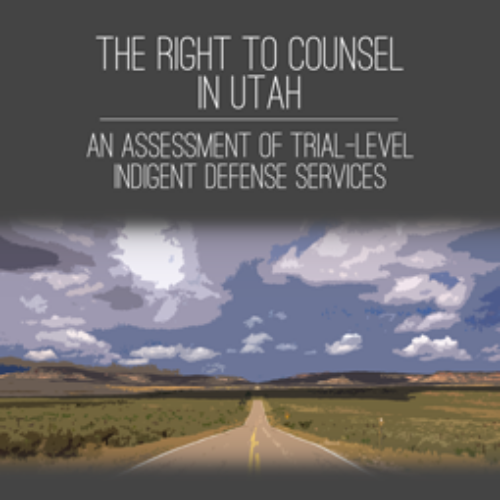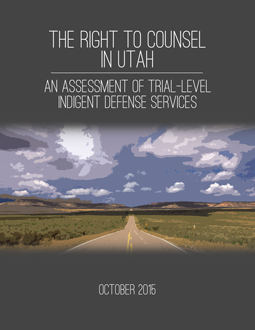In wake of 6AC report, legislative changes are already afoot in Utah

Pleading the Sixth: On the heels of the 6AC report, the Utah Judicial Council adopted a report on October 26, 2015, by an indigent defense study committee calling for significant state actions, including a statewide commission with authority to set standards (workload, performance, attorney qualifications, etc.) and monitor compliance, the first-ever statewide funding, and a ban on flat fee contracts, to name a few. The report has even suggested draft legislative language. (In Part I of the story, here, read about one defendant’s experience as symptomatic of the issues.)
 On October 26, 2015, the Utah Judicial Council (UJC) – the policy-arm of the judicial branch of government – received and adopted a report from the UJC’s Study Committee on the Representation of Indigent Criminal Defendants in Trial Courts, setting forth legislative and other recommendations to improve the right to counsel in that state. The adoption of the report makes the recommendations official policy of the UJC.
On October 26, 2015, the Utah Judicial Council (UJC) – the policy-arm of the judicial branch of government – received and adopted a report from the UJC’s Study Committee on the Representation of Indigent Criminal Defendants in Trial Courts, setting forth legislative and other recommendations to improve the right to counsel in that state. The adoption of the report makes the recommendations official policy of the UJC.
The report makes three findings:
First, “there is lack of State oversight of the multitude of county and municipal indigent defense systems. This results in a dearth of information about how local systems function and whether they meet constitutional standards for providing indigent defense. It also means that local governments are left to their own sometimes-limited resources in seeking to discharge their indigent defense responsibilities.;”
Second, “some contracting conventions, such as the use of all-inclusive, flat-fee contracts, create systemic disincentives that may negatively affect the provision of defense services. The use of those contracts can create a structural tension by pitting an attorney’s financial interests against the best interest of a client;” and,
Third, “Utah’s justice courts face systemic pressures from a high volume caseload and a lack of uniformity in information and procedures to assure compliance with constitutional requirements.”
The report includes an appendix with draft legislative language for consideration in the 2016 session, including the creation of a statewide indigent defense commission to provide statewide oversight of indigent defense services and to promulgate standards and to provide training, economic assistance, and other resources to local jurisdictions to meet constitutional obligations for indigent defense.
As currently proposed, the commission would be made up of 11-members: “(a) One member appointed by the Utah Commission on Criminal and Juvenile Justice; (b) One member appointed by the Utah Administrative Office of the Courts; (c) . . . two members who are practicing criminal defense lawyers appointed by the commission after considering recommendations from the Utah State Bar and the Utah Association of Criminal Defense Lawyers; . . . (d) The acting director or designee from the legal defender’s association of the county of the first class; (e) Two members appointed by the Utah Association of Counties from its membership, one from a county of the second class, and one from a county of the third through sixth class; (f) Two members appointed by the Utah League of Cities and Towns; (g) One member appointed by the Statewide Association of Prosecuting Attorneys; and (h) One member appointed by the Utah State Bar to represent minority interests.”
Standards required to be promulgated include, among others: a) defender independence; b) non-conflicted representation; c) early appointment of counsel; d) banning flat fee contracts; e) attorney qualification and training; f) workload controls; g) continuous representation by the same attorney; and, h) supervision.
The 6AC will keep you posted on the progress!


